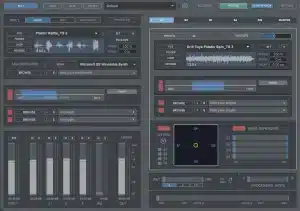Top 10 Granulizer Plugins 2019 Granulizers seem to be getting popular these days so it is only natural that we start looking for what’s cool & trendy for this year, but first WHAT IS A GRANULIZER? Granulizers and Granular synthesis in general works by taking an audio sample and dividing…

5 Reasons You Should Mix With Only Stock Plugins
There are many great third party plugins available for every effect you can imagine, but many DAWs have some terrific options bundled with them. In this post I am going to give you 5 reasons how mixing exclusively with stock plugins can help you.
1. SAVE MONEY
Obviously the first benefit that comes to mind when mixing with stock plugins is that if you stick to what is already included in your DAW, then you won’t have to fork out extra money on third party plugins. As audacious as it might sound coming from someone who makes a significant amount of income from the production of third party sample libraries, hear me out. I am not simply saying, don’t buy third party plugins at all, but rather to buy smart. Make a wish list of your must have plugins, be patient and take advantage of great deals on discount sites (shameless plug) when they come up rather than impulse buying every new plugin that is released.
2. IMPROVE KNOWLEDGE OF YOUR DAW
Have you ever looked at your list of available plugins and noticed that there is a good lot of them you have never if rarely used? How does that happen? Well, gear lust is the short answer, but the unfortunate truth is that many producers often don’t spend enough time living with the stock plugins in their own DAW. I have had many a conversation with colleagues that would admit to overlooking stock plugins in their DAW, eschewing them for third party ones. While I certainly own and use many third party plugins myself, as a producer that moves from studio to studio (and DAW to DAW) on a regular basis, stock plugins are my best friend! I recommend digging deep into your DAW and really exploring the plugins in detail. Doing so will help you work towards total mastery of your DAW, allowing you to be more effective and creative in your work. Speaking of which…
3. EXERCISE CREATIVITY THROUGH LIMITATIONS
The flip-side of working with only stock plugins is having too many third party plugins from which to choose. Sometimes having too many options is more limiting than freeing. After all, having 100 options for a vocal compressor doesn’t make you 100 times more effective as a producer does it? Limiting yourself to using just a few plugins can have tremendous benefits creatively. By experimenting with otherwise vanilla plugins you may discover novel ways of putting them to use to produce effects that you otherwise would have used a specialized plugin to create.
4. DEVELOP FUNDAMENTAL MIXING SKILLS
One of the most popular questions I see in music production groups and forums is “what are your favourite plugins for mixing?” My short and somewhat dry answer is usually: Compressor, EQ, Reverb, Distortion. The answer may seem overly simple (and to an extent it is), but when it comes down to it, assuming you are working with quality source material, the above are simply the basics of what are needed to produce a good, client approved mix.
Every DAW has at least one of each of the above plugin types that will do the job just as well as expensive third party plugins. I find that working with stock plugins helps keep me honest and forces me to focus on sound technique. While your DAW’s plugins might not have the flashiest, most awe inspiring design or offer thousands of presets, they will all, most certainly be fundamentally capable. Use the opportunity to revisit and or develop your knowledge of compression, equalization and other processing and to understand how the various parameters work.
5. COMPATIBILITY & STABILITY
Plugin developers do their best to ensure that their plugins are compatible with all major DAWS, but there are a lot of variables for the developers to consider: Multiple operating systems, DAW versions, etc… It certainly doesn’t help that the two major flavours of operating systems roll out significant updates to their software on an annual basis.
Plugins native to your DAW, on the other hand, by their nature have to deal with fewer variables as DAW versions is at the least removed from the equation. This is not to say that DAWs themselves are not prone to crashes due to their own bugs, but removing third party plugins from the equation certainly limits the opportunity for crashes. Lastly, if you often jump from studio to studio or collaborate with a team as I do, then stock plugins radically simplify the process of sharing and accessing projects.







